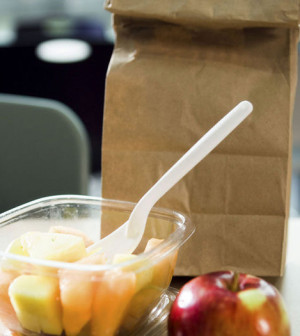- Could Your Grocery Store Meat Be Causing Recurring UTIs?
- Are You Making This Expensive Thermostat Error This Winter?
- Recognizing the Signs of Hypothyroidism
- 10 Strategies to Overcome Insomnia
- Could Artificial Sweeteners Be Aging the Brain Faster?
- Techniques for Soothing Your Nervous System
- Does the Water in Your House Smell Funny? Here’s Why
- Can a Daily Dose of Apple Cider Vinegar Actually Aid Weight Loss?
- 6 Health Beverages That Can Actually Spike Your Blood Sugar
- Treatment Options for Social Anxiety Disorder
Heavy Moms Likelier to Pile Food on Kids’ Plates: Study

Obese and overweight moms seem to serve their kids more food at meals, potentially boosting their risk for childhood obesity.
University of Florida researchers asked mothers to describe their level of hunger and that of their 3- to 6-year-olds before meals. Twenty-nine children took part in the study.
Women who were overweight or obese reported feeling hungrier and thought their kids were hungrier, too. Then, they gave them bigger portions.
“Because young children have difficulty recognizing when they are full, the more food they are presented at mealtime, the more they are likely to eat,” lead investigator Sarah Stromberg said in a university news release. Stromberg is a doctoral student in the Department of Clinical and Health Psychology.
Study senior author David Janicke, a professor of clinical and health psychology, said, “If we can start to identify those factors, we might be able to intervene to help parents develop more appropriate portion sizes for younger kids, which hopefully can lead to a longer life of healthy eating habits.”
The researchers noted that the findings are preliminary, because the study was small.
“This study was a good starting point, and ultimately if we’re able to see these findings replicated we can intervene with knowledge, awareness and strategies to help parents and kids work together to limit how much kids are being served,” Janicke said.
Meanwhile, how can parents make sure their kids don’t eat to excess?
“Parents decide what to serve their kids and when, but kids still should have a reasonable amount of control over how much they eat,” Janicke said. “If kids eat an appropriate serving size and are still hungry, they can ask for more.”
The study appeared in the June issue of the Journal of Human Nutrition and Dietetics.
More information
For more about kids and diet, visit nutrition.gov.
Source: HealthDay
Copyright © 2026 HealthDay. All rights reserved.










